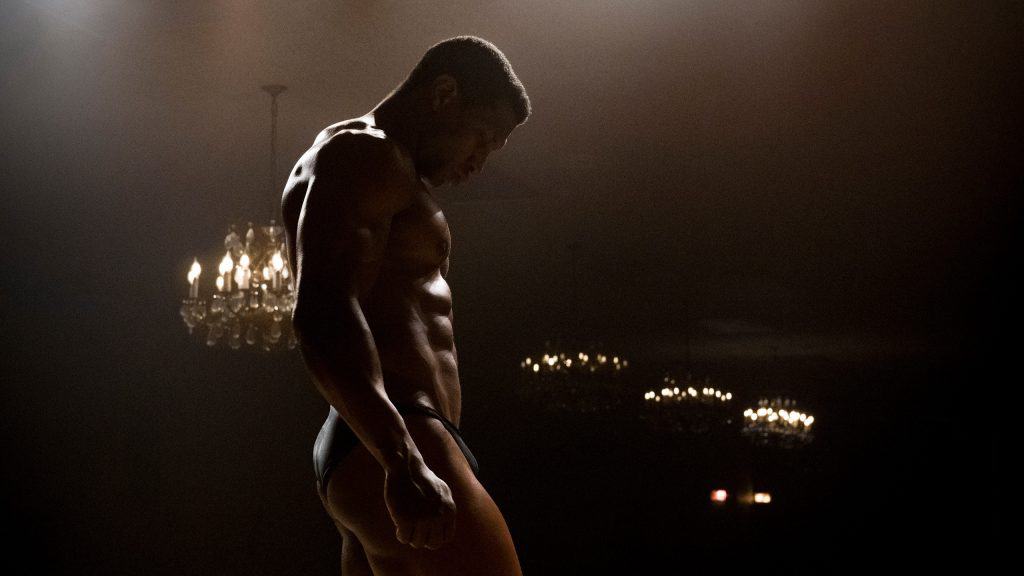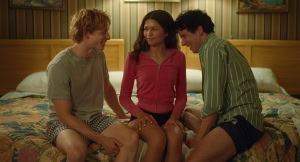Killian Maddox just wants to be seen.
In Elijah Bynum’s film Magazine Dreams, Maddox (Jonathan Majors) is an amateur bodybuilder. Other than his elderly grandfather, whom he lives with and cares for, bodybuilding is his sole reason for being. Maddox covers his bedroom walls and ceiling with posters and magazine pages of powerful physiques. He consumes 6,000 calories daily, takes steroid shots in the bathroom, and pushes his muscle-packed body to the brink. It is a punishing, brutal routine to reach the peak of physical perfection, to be judged and appraised for it. In Maddox’s mind, already weakened by an undisclosed mental illness, the physical and psychological pain is worth it. The glory is in being seen, appraised, and, hopefully, forming a genuine bond with anyone who can appreciate his carefully-cultivated physical beauty.
The world is much more complicated than Maddox’s desires, and Magazine Dreams takes its time immersing him in the harsh realities. His social awkwardness and uneven mental state leave him unable to cope with even the slightest negative experience. (And slight is not a word that applies to this film.) He walks the fraying tightrope that Bynum lays out for him, always teetering towards oblivion. Try as he might, Maddox sometimes fails to contain himself from disturbingly violent outbursts. Bynum pushes us to the edge with him, never quite telegraphing what could set him off. Rejection, bullying, physical assault, manipulation, and sexual coercion yield varying degrees of response from him, different from expectations. For all of the physical and psychological violence, Maddox’s erratic reactions yield the most discomfort.
Bynum bolsters that unpredictability through his stylistic choices. He often bathes Maddox in either blue or orange palettes, but they don’t always signal his present mental state. Instead, they suggest the potential for an abrupt, devastating shift. Maddox’s date with his coworker Jessie (Haley Bennett) indicates a brutal outcome by its orange hue, but it ends with solitary resignation. Meanwhile, his explosive nighttime destruction of a paint store is awash in electric blue, implying calm where none exists. The unsettling contrast repeats in the sound: a pile-driving metal track backgrounds Maddox’s drive to his date. At the same time, an ethereal orchestral piece precedes his dream-cum-nightmare interaction with long-time bodybuilding hero Brad Vanderhorn (Mike O’Hearn).
Magazine Dreams can be deeply unsettling, but not without reason. Bynum is knee-deep in the conversations around toxic masculinity and how poor mental health can exacerbate a man’s worst impulses. His film is unique because it explores the tenuous connection between aesthetic and emotional attraction. Maddox appears to pursue bodybuilding because it‘s a conduit to the human relationships that his limited social graces keep him from. The film’s most affecting scenes devastatingly challenge Maddox’s logic. It aches to see him stoically recoil when a sex worker’s (Taylour Paige) admiration doesn’t translate to romantic affection. It’s even worse seeing his tears after a non-consensual sexual encounter with Vanderhorn, a man he fixated on because of their shared physical perfection and interests.
To its detriment, Magazine Dreams doesn’t hang onto this compelling part of the conversation. Instead, Bynum tries to cover every aspect of toxic masculinity, even if it’s tangential to Maddox’s bodybuilding career. He can lose sight of threads that would undoubtedly impact Maddox’s goal, like his steroid use and possible disordered eating. (Maddox’s Blackness plays a key role, but the film doesn’t fully explore it in a bodybuilding context.) While it doesn’t cease to be gripping, the always-on frenzied intensity does wear the film down, particularly as it flirts with the seemingly inevitable outcome of his anger curdling into homicidal violence. As he does throughout, Bynum subverts those expectations and lands in a surprisingly hopeful place for Maddox that cashes in on the tremendous empathy he elicits.
The empathy for Maddox is primarily a consequence of Jonathan Majors. Magazine Dreams, a deep character study requiring a thoroughly absorbing screen presence, would collapse if it didn’t rest on Majors’ shoulders. His performance is astoundingly fearless, a blood-soaked excision of artifice that reveals the resilient but unstable man beneath the steely musculature. Ferocity informs his physicality: every rep and movement dialed to the max, liquid seeping from every visible orifice. The same intensity shapes his quieter moments, where he vibrates with anxious, insecure energy and speaks with clipped, uneven tones. Majors’ greatest contribution is how his eyes communicate Maddox‘s potential to love and how desperately close he is. Majors manifests that ache brilliantly in an unforgettable performance that feels like a stroke of genius.
Magazine Dreams spares no sweat in examining modern masculinity. It casts its net far and wide, digging through a complex and chaotic discussion to locate something profound. While he doesn’t quite avoid the muck himself, Bynum does illuminate a path away from the needless violence and toxicity that he, the audience, and especially Maddox must travel. It is a punishing but worthwhile journey to, at the very least, see one of the finest working actors today deliver his best performance.
Magazine Dreams had its World Premiere in the U.S. Dramatic Competition section of the 2023 Sundance Film Festival.
Director: Elijah Bynum
Writer: Elijah Bynum
Rated: NR
Runtime: 124m
Magazine Dreams is a punishing but worthwhile journey to, at the very least, see one of the finest working actors today deliver his best performance.
-
GVN Rating 8.5
-
User Ratings (0 Votes)
0
A late-stage millennial lover of most things related to pop culture. Becomes irrationally irritated by Oscar predictions that don’t come true.







